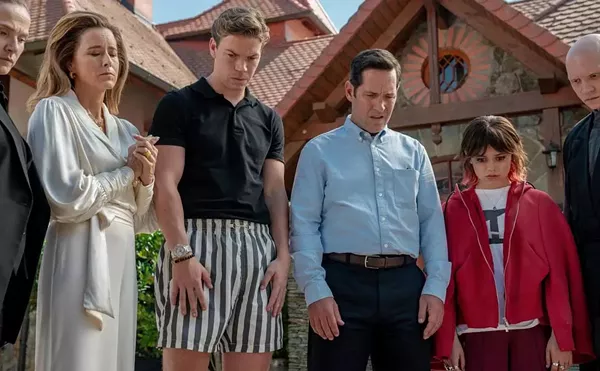Imagine if Frank Capra had made The Return of Martin Guerre (or even its American remake, Sommersby), and you’ll have some idea of the way director Frank Darabont has turned a mistaken-identity device into a lovely meditation on loss and restoration. The Majestic is a love letter to a certain type of movie and a certain kind of America — one which actually believes in the ideals it espouses. Darabont has created an irony-free fable about decency triumphing in the face of cowardice and shame.
Anyone familiar with his adaptations of Stephen King novels (The Shawshank Redemption and The Green Mile) knows to expect two things from Darabont: absolute sincerity and a lengthy running time. The Majestic (at two-and-a-half hours) takes its own sweet time to unravel this heartfelt tale, a pace that reflects the small-town rhythms of Lawson, a picturesque California coastal town, in 1951. It’s here that Hollywood screenwriter Peter Appleton (Jim Carrey in Truman Show mode) washes ashore with no memory of his former life, and is immediately identified as one of Lawson’s favorite sons, Albert Lucas “Luke” Trimble, who was missing in action after D-Day.
If amnesia happened in real life as often as it does in the movies, it would be a widespread epidemic. This said, screenwriter Michael Sloane uses this shopworn device exceedingly well. When the audience first sees Peter, he’s at a script meeting trying to keep a straight face as studio executives are dumbing down his serious “issue” screenplay, Ashes to Ashes, about a West Virginia miners’ strike. It’s his attempt at respectability after the swashbuckling B-movie, Sand Pirates of the Sahara, yet Peter is quick to capitulate. He’s a Hollywood yes man, willing to say anything to stay in the movie kingdom’s fast lane.
After attending the premiere of Sand Pirates with his starlet girlfriend (who plays a kidnapped ingénue in a hilariously dead-on clip), Peter is a happy man, reveling in his good fortune. Then the roof caves in. He’s called to testify before the dreaded House Un-American Activities Committee, where he’s guilty of being a Communist until he’s proven innocent (or at least redeemable) by naming names of fellow travelers.
Suddenly a blacklisted pariah, Appleton sees his promising future slipping away, and goes for a drunken road trip up the Pacific Coast Highway, only to drive off a bridge and wash ashore outside Lawson. It’s there that Sloane’s choice begins to make sense: Amnesia makes Peter a blank slate whose character can now be rebuilt in the mold of the lost Luke, a decent, stalwart and brave American.
There’s an added poignancy here. Luke’s magical reappearance not only affects his elderly father, Harry (Martin Landau), and the pretty, spunky girl he left behind, Adele Stanton (Laurie Holden), but the whole town, which lost 62 young men in World War II, a devastating number for such a small community. When Harry takes Luke’s return as a sign to reopen the town’s movie palace, the aptly named Majestic, he demonstrates not only his devotion to a community which is beginning to come alive again, but the same love for the transformative power of cinema which drove Peter to Hollywood in the first place.
The idyllic Lawson (it’s actually Ferndale, Calif., listed on the state’s register of historical landmarks) is the ultimate movie town, the type of place Andy Hardy called home, a bedrock of American idealism and generosity of spirit. Director Darabont and screenwriter Sloane were joined by 11 fellow alumni of Hollywood High to make The Majestic, and what’s interesting is that it doesn’t reflect their decade, the 1970s. Instead, it’s a nostalgic throwback to an era when movies were king and could actually function as a moral barometer (something the censors realized before the filmmakers).
What’s amazing is that The Majestic manages to be neither corny nor saccharine. It’s unapologetically old-fashioned in its outlook and taste, like a warm serving of homemade apple pie in a diner that exists only in the collective American imagination. Hungarian immigrant Darabont makes Lawson seem not only like a safe haven from our dangerous, divisive times, but tantalizingly within reach.
Serena Donadoni writes about film for Metro Times. E-mail her at [email protected].





